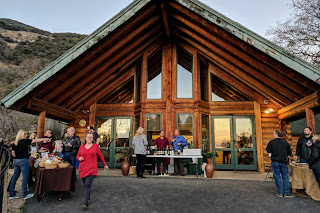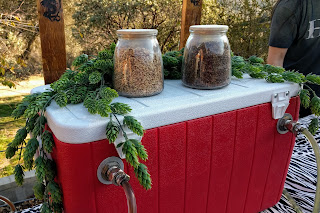First, let me assure you the tiger was not given any alcohol. The lions also abstained. No cats partook of alcoholic beverages during Project Survival’s Wine and Growlers event, not even Annabelle, the domestic shorthair. What’s more, Cat Haven’s founder didn’t, either. He never does.
I have this inside information because Dale Anderson, my brother, is the founder, and we grew up in Sonoma County -- wine country. Our parents moved up from Southern California when Dale was a preschooler, and friends and family were always coming up to visit, and they always took wine tours (Dale says he could still give the Christian Brothers tour). Those winery tours bored the heck out of us, so as children, we vowed to each other we would not drink.
He just stayed more faithful to the vow than I did.
During those years in Sonoma County, the dream that eventually became the Cat Haven began when a man brought a mountain lion for one of Dale’s junior high classes.At first, Dale just wanted a big cat of his own, but over the years, the dream grew. He founded Project Survival, an organization dedicated to preserving cats in the wild. As part of that mission, the Cat Haven has about 30 cats -- from cheetahs to leopards to jaguarundis and Pallas’ cat -- people can see so they’ll be encouraged to support wildlife conservation.
The admission fees help keep the facility running, but the mission of Project Survival is much bigger than that. Through events and donations, they support researchers in the wild and projects that help mitigate problems where the cats and people share territory. The organization has to be creative in their fundraising -- thus, Wine and Growlers.
The event was for people 21 and up, with local cheese and chocolate rounding out the offerings from local vineyards and breweries. We’ve been to Project Survival’s Cat Haven countless times since it opened, but for this night only, we’re calling the Cat Haven our bar, since wines from Kings River Winery, Marechal Vineyards, and Riffelhof Vineyards and beers from House of Pendragon and Tactical Ops were all available for tasting. Riffelhof Vineyard even released a new wine, Feline Fierce Zinfandel, at the event.
For most folks, the main draw for the evening was the opportunity to take a sunset tour through the grounds; to hear Titan the lion roar, to wait for Dianna the white tiger dive into the spring-fed pond to chase her ball, or to see snow leopards Anna and Elsa. People came back from their tours talking excitedly about what they’d seen, and then they enjoyed their beverages while they sat in the picnic areas watching the sunset and listening to Boxcar Figaro, a local band.
After we helped a little with setting up for the event, we took the opportunity to ask the two questions we always ask, “What makes for a good bar?” and “Whether you go or not, what makes for a good church?”
We asked our friend Jennifer, a keeper and administrator at the Cat Haven, who’s also a very delightful person. She said a good bar needed “atmosphere,” and as I always do, I asked her to expand on that. “Friendly and inviting,” she said. “You can order a drink without pomp and circumstance. Just order a beer and have instant friends.”
When I asked what makes for a good church, she said, “I have a skewed view on that. My boyfriend’s grandfather was a fire and brimstone preacher. He said most people came to church just to judge one another. To feel good about yourself by tearing other people down. It’s hard to find a legitimate church where you love your neighbor as yourself.” She said the best church she had been to was a Hispanic church in South Dakota. They didn’t even speak the same language but were still so very friendly and welcoming.
I also asked Kalene, who was pouring samples for House of Pendragon, our questions. It turns out she was filling growlers the night we’d visited HoP, and she said that in her non-brewery hours, she works in a preschool. In a good bar, she said, “It’s all about the bartender. If they’re friendly and strike up a conversation. Some won’t give you any attention, Ugggh. They’re rude. It’s all about the service.”
And what about a good church? “It’s based on the pastor. If I don’t like the message, if it doesn’t speak to me, not relevant to me, I won’t stay.” She told me a bit about her church history. Her family went to a church that had a good children's program and youth ministry. She loved the high school ministry of the church, particularly her youth pastor. But when she graduated and moved on to “big church” she didn’t like the pastor, so she didn’t stick around. Since then, though, she’s been going to People’s Church where she really likes the pastor.
In the past, my brother's brought big cats to churches, but I haven't seen a big cat in a bar. So enjoy the pictures of big cats in this post now. You’re as likely to see them here again as you are to see Dale with a beer.























